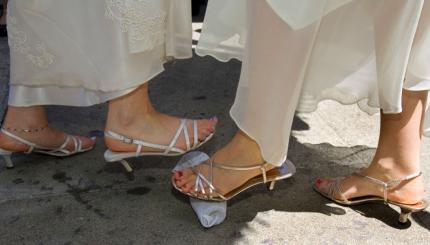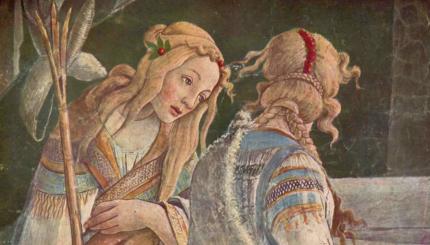Jews read sections of the Torah each week, and these sections, known as
parshiyot, inspire endless examination year after year. Each week we will bring you regular essays examining these portions from a queer perspective, drawn from the Torah Queeries online collection, which was inspired by the book Torah Queeries: Weekly Commentaries on the Hebrew Bible. This week, Jo Ellen Green Kaiser examines Parashat Matot and Parashat Masei, taking a careful look at vows and the role of women in a patriarchal society.
At the close of Bamidbar/Numbers, the fourth book of Torah and the last book of the Jewish journey to the Promised Land, Moses engages in a long colloquy with the leaders of the tribes (
matot
) on the nature of oaths and vows. Parashat Matot begins with Moses instructing the leaders of the people on when vows can and cannot be broken. Parashat Masei (“Marches/Travels”) closes with tribal leaders asking Moses to adjust the vow made by Moses to the daughters of Zelophehad that they would inherit their father’s portion.
Strikingly, both of these discussions center particularly on women and vows. In Matot, we learn that a man has no choice: if he makes a vow or oath, he must “carry out all that has crossed his lips.” Whether a woman must carry out her vow—or even whether she is permitted to carry out such a vow—depends very much on her social status. If she is divorced or widowed, i.e., outside the sphere of a man’s influence, then her vows cannot be broken; she has the same status as a man in this regard. However, the world of Torah is patriarchal: if a woman is married or if she is an unmarried woman living in her father’s house, then she is considered subservient to the male head of the household, and he has the right to dismiss her vow.
Before we shudder about the inequality of women’s roles in the Torah, we should take a second look. What is perhaps most surprising about this discussion of vows is how limited a man’s power is to circumscribe women’s obligations. The man only has 24 hours after learning that his wife or daughter has taken a vow to cancel it. If he does not act in that time, the vow is in full force. In fact, if the man forces the woman to annul her vow after that time, it is he, not she, who will suffer the divine consequence.
The Daughters of Zelophehad (illustration from the 1908 Bible and Its Story Taught by One Thousand Picture Lessons)
Moses faces precisely this kind of challenge at the end of parashat Masei. The leaders of the tribe of Manasseh come to Moses with a problem. Moses has just divvied-up the land of Israel, giving set acreage to each tribe. The problem for Manasseh is that back in Numbers 27, Moses vowed to give the daughters of Zelophehad, members of Manasseh, their father’s inheritance, as there were no male heirs. Yet, in tribal Israeli culture, if Zelopohehad’s daughters married, their heirs would be considered members of their husband’s tribe, and thus some tribe other than Manasseh would inherit their land.
Moses cannot break his vow, because it was not a simple legal agreement made with these daughters but a vow made in the name of God—God said, “The pleas of Zelophehad’s daughters is just; you should give them a hereditary holding among their father’s kinsmen; transfer their father’s share to them.” Moses had to let that vow stand, yet he had to do something; tribal leaders would revolt if they thought that women could inherit land that would then pass out of the tribe’s control. Moses’s solution was that the daughters of Zelophehad had to marry within their own tribe, so that their heirs would be members of the tribe Manasseh.
The case of Zelophehad’s daughters illuminates the constraints around women’s vows in
parashat Matot
. Even though women in the biblical world have far fewer rights than men, parashat Matot insists that women have full rights before God—they have the same ability as men to forge a private relationship with God through vows. Martin Buber, the great Jewish philosopher, calls this relationship the I-Thou relationship. God sees us for who we are; when we stand before God, we are naked, stripped of the social world that usually surrounds and binds us. We speak to God “face-to-face.”
In the world, however, we rarely are able to maintain an I-Thou relationship with God or even with each other, seeing each other as the person we really are. The social world intrudes, with its material requirements. Such is the situation for women in the biblical world. Their entire society was patriarchal, based on the rule of the householder over his house, the rule of the tribe over the householders, and eventually, the rule of the king over the tribes. These relationships are not I-Thou relationships, but I-It relationships; individuals are not known for who they are in themselves, but as objects, objects that dictate their role in the tribe.
Because the society was patriarchal, women had no agency at all in the social structure. Thus, allowing them to have an I-Thou relationship was dangerous, as an I-Thou relationship is predicated on the complete agency of the two who face each other. So, Torah allows the man who has most agency over a woman in the society, that is, who has the strongest I-It relationship to her, to prevent her I-Thou relationship with God. That the discussion of vows is really a discussion of the implementation of patriarchy is made clear by the fact that Moses only gives instructions about vows to the heads of the tribes (rashei ha matot). The instructions here are not about the value of women’s vows; the instructions are about how these leaders can preserve patriarchy.
Allegro Photography
We like to think we have moved far from the tribal society of Moses’ time, yet I see many comparisons. Reading this parasha brought to my mind the fight over same-sex marriage. In Judaism, the wedding ceremony itself does not entail a vow to God, yet marriage itself is understood as a sacred covenant, made by two people in the sight of God. Marriage is the ultimate I-Thou relationship between two people, a commitment to know each other as we really are, to see each other “face-to-face.” As we agree to meet the other as ourself, we bring ourselves closer to God as well. This is precisely the difference between marriage and a “domestic partnership.” A domestic partnership is a legal arrangement, in which we cede each other certain rights. A marriage is a sacred covenant, in which we agree to treat the other as a “Thou.”
Just as leaders of the matot were concerned that women’s vows would overturn their patriarchal society, so leaders of our civil society are concerned that gay and lesbian vows will overturn our hetero-normative society. They understand—we understand—that there is real power in the I-Thou relationship, a power that tends to overturn social mores and social structures. Seeing another as oneself is in some ways both the most sacred and most transgressive act, an act that defies social boundaries and cultural customs.
What I find most inspiring about Matot Masei is that Torah tells us that God welcomes this powerfully transgressive relationship. God welcomes the women of ancient Israel to make vows as well as men. God welcomes us to forge I-Thou relationships with God and with each other. It is not God who stands in the way of our deepest relationships. It is society that is not ready for God.
Like this post? Join the conversation through MyJewishLearning’s weekly blogs newsletter.
Get breaking LGBTQ Jewish news, resources and inspiration in your inbox!
Torah
Pronunced: TORE-uh, Origin: Hebrew, the Five Books of Moses.


